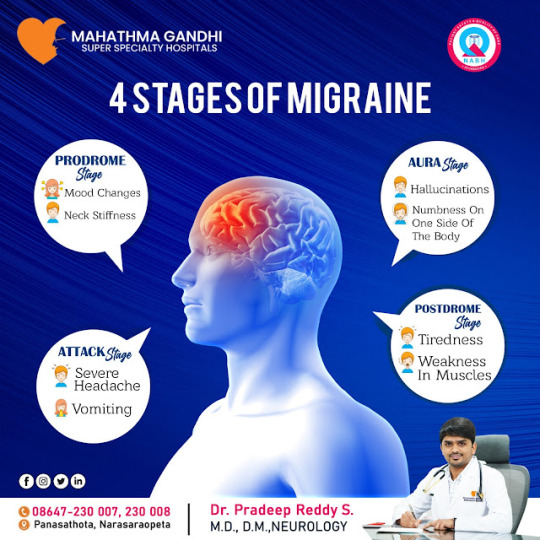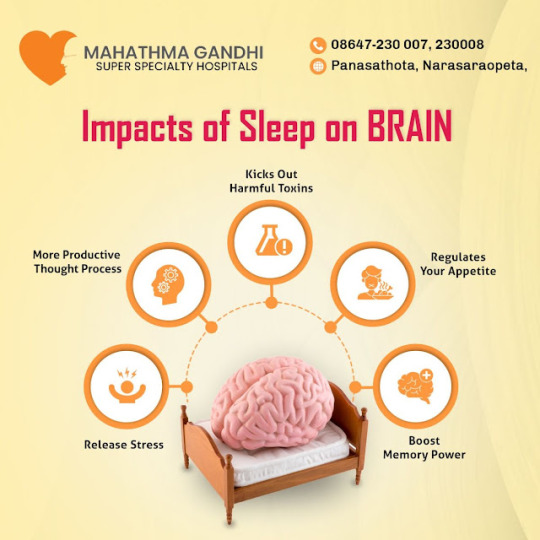#best neuro specialist in narasaraopet
Text
Stages of a migraine attack to your brain | Mahathma Gandhi Super Speciality Hospitals

Migraine is a neurological condition that affects millions of people worldwide. It is characterized by a severe headache that can last for hours or even days, accompanied by a range of other symptoms. Migraines can be triggered by various factors, including stress, hormonal changes, certain foods, and environmental factors. In this blog post, we will discuss the stages of a migraine and the symptoms that accompany each stage.
1. Prodrome Stage
The prodrome stage is the first stage of migraine and occurs one or two days before the onset of a headache. During this stage, you may experience a range of symptoms, including:
Mood changes: You may feel irritable, depressed, or anxious.
Food cravings: You may crave certain foods or experience changes in appetite.
Fatigue: You may feel tired or lethargic.
Neck stiffness: You may experience neck pain or stiffness.
Sensory changes: You may experience visual disturbances, such as seeing flashing lights or zigzag patterns.
2. Aura Stage
Not all migraines have an aura stage, but for those that do, it occurs before the headache and can last for up to an hour. During this stage, you may experience:
Visual disturbances: You may see flashing lights, zigzag patterns, or blind spots.
Sensory changes: You may experience numbness or tingling in your face, hands, or arms.
Language difficulties: You may have difficulty speaking or understanding speech.
Motor problems: You may experience weakness or difficulty moving your limbs.
3. Headache Stage
The headache stage is the most well-known stage of a migraine and can last from a few hours to several days. The pain is usually unilateral (on one side of the head), although it can also be bilateral (on both sides of the head). During this stage, you may experience:
Throbbing pain: The pain is often described as a throbbing or pulsating sensation.
Sensitivity to light, sound, and smells: You may find that bright lights, loud noises, or strong smells make your headache worse.
Nausea and vomiting: Many people with migraines experience nausea and vomiting during the headache stage.
Lightheadedness: You may feel dizzy or lightheaded.
4. Postdrome Stage
The postdrome stage is the final stage of migraine and occurs after the headache has subsided. During this stage, you may experience:
Fatigue: You may feel exhausted or drained.
Difficulty concentrating: You may find it challenging to focus or think clearly.
Mood changes: You may feel euphoric, irritable, or depressed.
Muscle weakness: You may experience weakness or discomfort in your limbs.
Migraines can be debilitating, but knowing the stages of a migraine can help you prepare for and manage the symptoms. If you experience frequent migraines, it's essential to seek medical advice to determine the underlying cause and develop a treatment plan that works for you.
Get Appointment:
Call: +91 8647230007
Visit: https://mahathmagandhihospitals.com/service/neurology/
#best neurology hospital in india#best neurology specialist in narasaraopet#best neuro specialist in narasaraopet#best neurologist hospital in narasaraopet#neurology#best neuro surgeon in narasaraopet#best doctors in narasaraopet#best hospital for critical care in narasaraopet#mahatma gandhi hospitals#mahathma gandhi hospital
1 note
·
View note
Text
Impact of Sleep on Brain: Best Neurologist in Narasaraopet | Mahathma Gandhi Hospitals
Sleep and brain hold a most beautiful story! Do you know how powerful and productive your brain gets with ample rest? Your appetite gets regulated, memory power gets boosted and stress gets released. Isn't that amazing? Understand every functionality that Mahathma Gandhi Hospitals acknowledge.

Sleep has a profound impact on the brain, as it plays a crucial role in various cognitive processes, including learning, memory, attention, and emotional regulation. Here are some of the ways in which sleep affects the brain:
Memory consolidation: During sleep, the brain consolidates memories by transferring them from short-term to long-term storage. Studies have shown that people who get adequate sleep perform better on memory tasks than those who are sleep deprived.
Cognitive function: Sleep plays a vital role in cognitive function, including attention, concentration, problem-solving, and decision-making. Lack of sleep can impair these functions, leading to decreased productivity and increased errors.
Brain plasticity: Sleep is also essential for brain plasticity, which is the brain's ability to reorganize itself and form new neural connections. Sleep deprivation can reduce brain plasticity, which can have a long-term impact on cognitive function.
Emotional regulation: Sleep is crucial for regulating emotions and managing stress. Lack of sleep can lead to increased anxiety, depression, and other mood disorders.
Brain waste clearance: During sleep, the brain clears out waste products, including beta-amyloid, a protein associated with Alzheimer's disease. Sleep deprivation can impair this process, leading to the accumulation of toxic substances in the brain.
In summary, sleep plays a critical role in the brain's function, including memory consolidation, cognitive function, brain plasticity, emotional regulation, and brain waste clearance. Adequate and quality sleep is essential for maintaining optimal brain health and function.
Get Appointment:
Call: +91 8647230007
Visit: https://mahathmagandhihospitals.com/service/neurology/
#best neurologist hospital in narasaraopet#best neurologist in narasaraopet#best neurology specialist in narasaraopet#best neurology specialist#emergency care services in narasaraopet#health insurance hospital in narasaraopet#best doctors in narasaraopet#mahatma gandhi hospitals#best neurology hospital in india#best neuro specialist in narasaraopet
0 notes